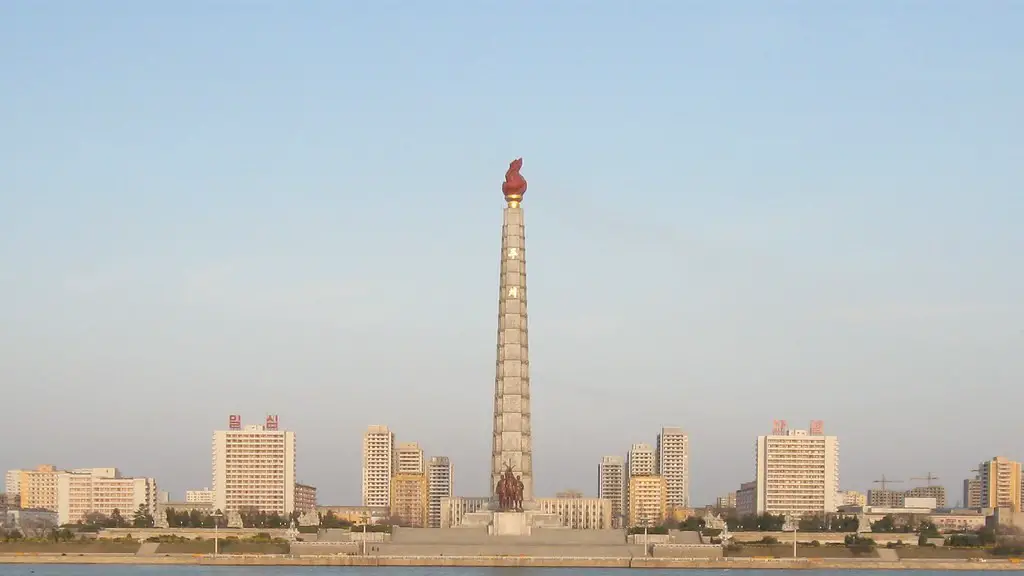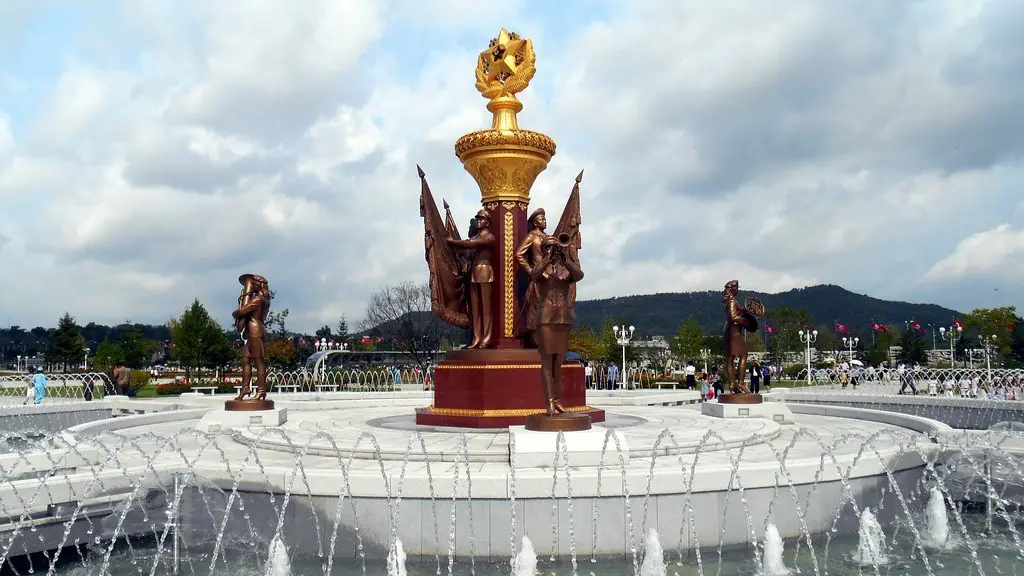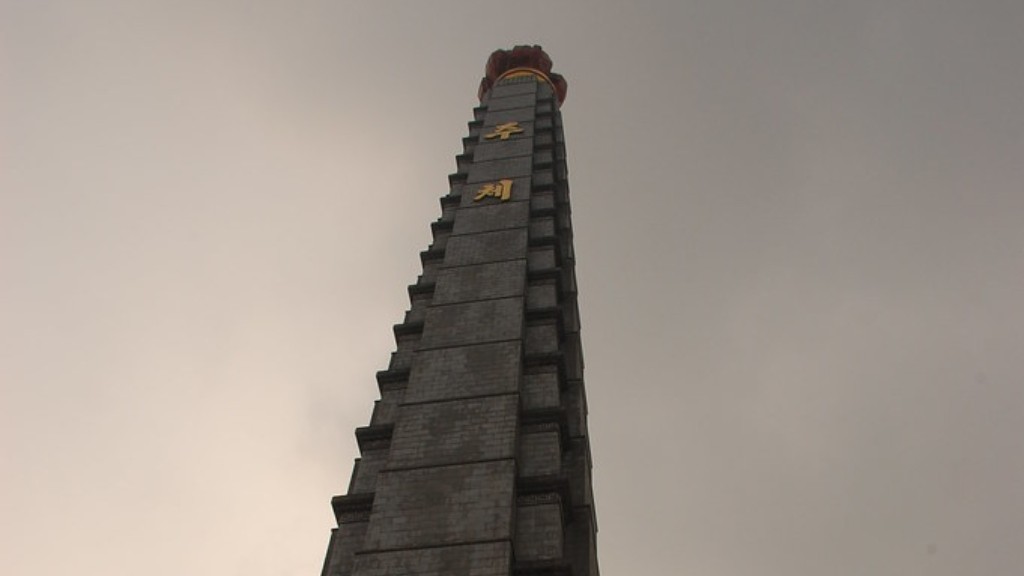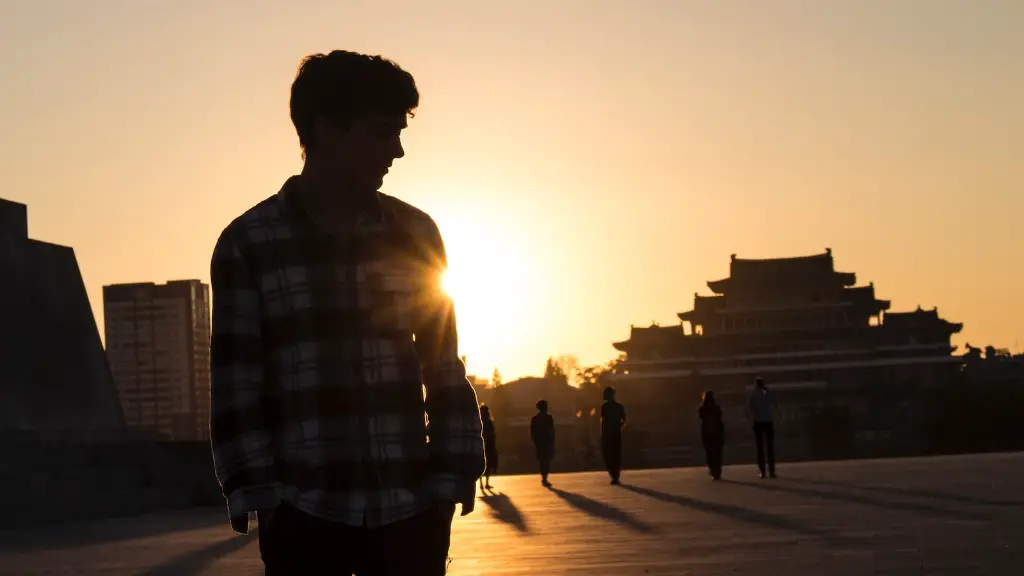How Does Totalitarian North Korea Refer To Its Leader
North Korea is a country that has been ruled as a totalitarian state since its inception in 1948. The official ideology of the regime is known as “Juche”, and the leader of the state is given a variety of honorific titles. North Koreans refer to their leader as either “The Great Leader”, “The General of The Revolutionary Army”, “Beloved Leader” and “Eternal Leader” in order to express their love and admiration for him. He is also known as “The Marshall of the Democratic People’s Republic of Korea”, in order to emphasize his role as the country’s commander in chief.
In 2010, the current leader of North Korea, Kim Jong Un, was declared “Supreme Leader” by state media. This title was used to emphasize the preeminence of his rule and was seen as a way to further solidify his legitimacy. In addition, he has been granted the titles of “Chairman of the National Defense Commission” and “First Secretary of the Workers’ Party of Korea”. These titles were meant to emphasize the importance of Kim Jong Un to the country’s defense and political ideologies.
The official ideology of the regime is based on the teachings of the state’s founding father, Kim Il Sung, and his son, Kim Jong Il. Kim Il Sung developed the concept of “Juche” (self-reliance) which is still widely understood and practiced in North Korea today. The Kim dynasty has used “Juche” to justify their totalitarian control over the country and its citizens. The idea of self-reliance has been used to legitimize the rule of the Kim family and to discourage outside influence and competition. This has been done through the creation of a complex network of state propaganda, designed to cultivate loyalty to the regime.
The Kim family is venerated in North Korean society and is usually referred to in official state media as “The Mt. Paektu Bloodline” or “The Everlasting Bloodline of the Great Revolution”. Through these titles, the regime seeks to emphasize the importance of the Kim family to the country’s success and future. Additionally, the titles are meant to cultivate a sense of patriotism and loyalty amongst the North Korean people.
Kim Jong Un is still the figurehead of North Korea and the regime’s narrative relies heavily on his image. He is often seen in state propaganda as a wise, strong and benevolent leader who is devoted to the protection and prosperity of the North Korean people. This narrative is used to solidify the legitimacy of the Kim family and to discourage any dissent. Additionally, it is meant to foster a strong sense of allegiance to the regime amongst the population.
Praise and Worship of Kim Jong Un
The state media often praises and worships the Kim family, in particular Kim Jong Un. They use a variety of terms to laud his leadership and to instill loyalty amongst the North Korean people. These phrases include “the most beloved leader of the people”, “the guarantee of bliss for all”, “the master of security and wealth” and “the protector of the people”, among others. These terms are used to depict Kim Jong Un as a deity-like figure who is responsible for the nation’s success and must be worshipped as such.
The North Korean government also encourages the worship of Kim Jong Un outside of the country, particularly in areas with large expatriate North Korean communities. State-sponsored propaganda is often used to depict Kim Jong Un as the nation’s savior who is destined to bring the country to greatness. This narrative is used to appeal to expatriate North Koreans who are often alienated from their homeland and eager to reconnect with their culture and identity.
The North Korean media also lauds Kim Jong Un’s personal qualities. They often depict him as an intellectual giant and an infallible leader whose wisdom and strength are beyond compare. These qualities are used to solidify the image of Kim Jong Un and to encourage citizens to view him as an infallible leader who is destined to lead the country to prosperity.
Role in Propaganda and Control
Finally, the North Korean government uses Kim Jong Un’s image to maintain absolute control over its citizens and to discourage dissent. Citizens are taught to view the leader as an infallible figure whose decisions are never wrong. This narrative is used to discourage dissent and to make citizens willing to accept the leader’s decisions without question.
Furthermore, Kim Jong Un’s image is used in state propaganda to promote loyalty to the regime and to discourage any hint of resistance. Images of the leader are prominently displayed throughout North Koreans cities and towns, as a way of emphasizing his role as the nation’s leader. Citizens are encouraged to view Kim Jong Un with respect and reverence, and to accept his decisions as a matter of course.
This narrative is enforced through a variety of methods, including the state’s use of propaganda, censorship, and the threat of punishment or exile. This has created a climate of fear in the country and has made it difficult for citizens to oppose the regime or its policies. Through this system of control, the North Korean government has been able to maintain its absolute control over the population for decades.
Power of the Personality Cult
The power of the North Korean leader’s personality cult is evident in the country’s political system. Despite the country’s focus on self-reliance, the role of the leader is paramount in all aspects of the state and his decisions are seen as absolute. This has allowed the Kim family to maintain their grip on power for over 70 years and to maintain a tight control over the population. The North Korean government relies heavily on the personality cult of Kim Jong Un to legitimize and justify their rule.
The personality cult of Kim Jong Un is also evident in the state’s foreign relations. The leader’s image is a powerful tool in the regime’s attempts to garner support and legitimacy in the international community. The North Korean government has used images of the leader to appeal to expatriate North Koreans and to improve relations with other nations. The regime has also used Kim Jong Un’s image as a bargaining chip in international negotiations and has used it to project an image of strength and stability.
Finally, Kim Jong Un’s personality cult is a powerful tool that is used to solidify the regime’s power and to discourage any hint of dissent among the population. Through a variety of methods, the North Korean government has been able to maintain its absolute control over the population and to ensure that Kim Jong Un remains at the helm of the state.
Kim Jong Un’s Legacy
Since taking power in 2011, Kim Jong Un has taken the country in a more conservative and oppressive direction. He has cracked down on dissent and relaxed control over the press, while expanding the country’s nuclear weapons program. This has led to a further deterioration in the quality of life for many North Koreans and a heightened sense of fear and oppression that has driven many to flee the country.
Kim Jong Un’s legacy will be one of fear, repression and human rights abuses. He is directly responsible for the suffering of millions of North Koreans, who have been denied basic human rights and freedoms. His rule has been characterized by a disregard for human life and an indifference towards the plight of his own people.
Despite these abuses, Kim Jong Un’s personality cult has taken on a life of its own. Many North Koreans still view him as a benevolent leader and a figurehead of the nation. His image is still used in state propaganda and his name is still invoked in the state media. This has insulated the Kim family’s grip on power and has allowed them to remain in control of the country.
Limitations and Criticisms
The North Korean government has been strongly criticized for its oppressive rule and human rights abuses. This has led to a wave of international condemnation of the regime and its policies, including those of Kim Jong Un. The leader’s personality cult has also been criticized for its manipulative effects on the population and its role in legitimizing the government’s rule.
Furthermore, the personality cult of Kim Jong Un has had a limited effect on the population. Despite the state’s attempts to cultivate loyalty and allegiance, the population remains largely divided and apathetic towards the regime. This is largely due to the repressive nature of the government and the lack of freedom and opportunity in the country.
Additionally, the oppressive policies of the state have hindered the chances of economic development and growth. North Korea is one of the poorest countries in the world, and its economy has continued to decline under the rule of Kim Jong Un. This has exacerbated the suffering of the population and has led to widespread poverty, hunger, and demoralization.
Addressing the Challenges
There have been calls for the international community to address the challenges facing the North Korean people and their oppressive government. There have been attempts to open diplomatic channels with the regime, as well as to provide assistance to the population. Despite these measures, the situation has not improved significantly, and the population continues to suffer.
The international community must take action to address the challenges facing the North Korean people. This includes taking strong measures to ensure that the human rights of the population are respected and that the oppressive regime is held accountable for its abuses. It is also important to address the economic and political situation in the country, as this can help to improve the quality of life for its citizens.
Finally, the international community must work to reduce the influence of Kim Jong Un’s personality cult and to encourage the North Korean people to take control of their own destiny. Only then can the population hope to achieve true freedom and security. This will require strong international collaboration and a long-term commitment to improving the lives of the North Korean people.





